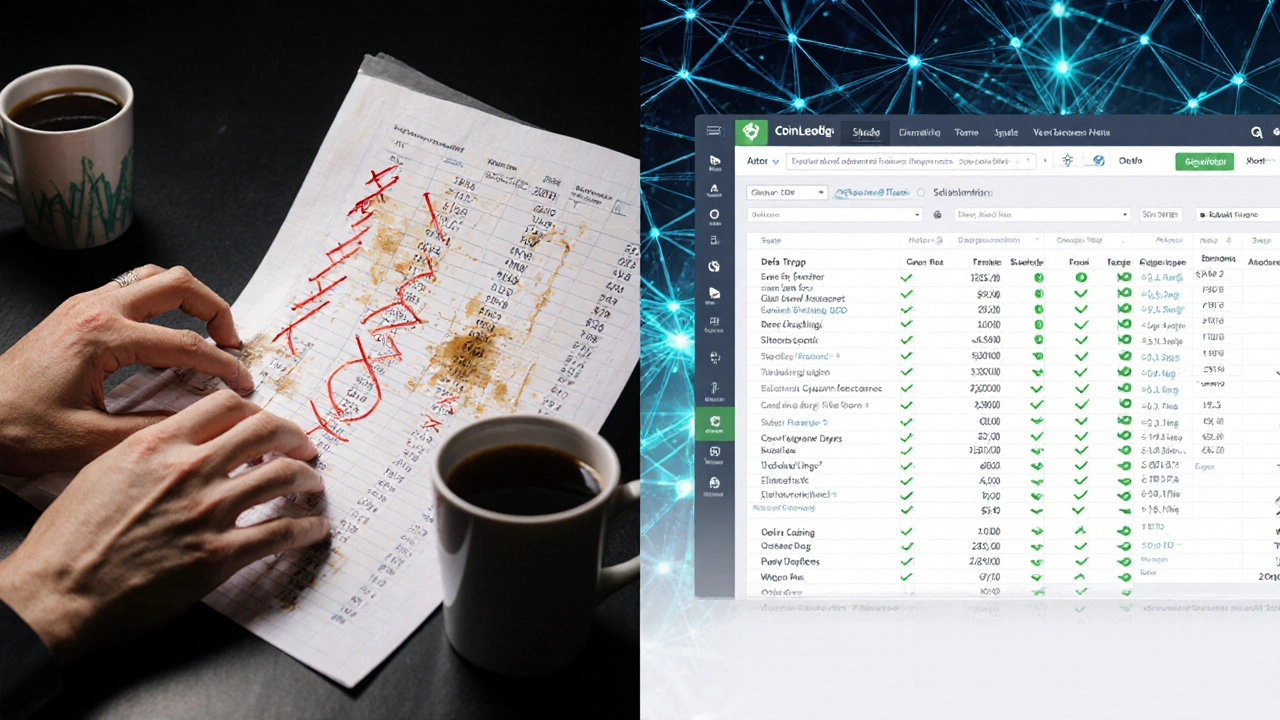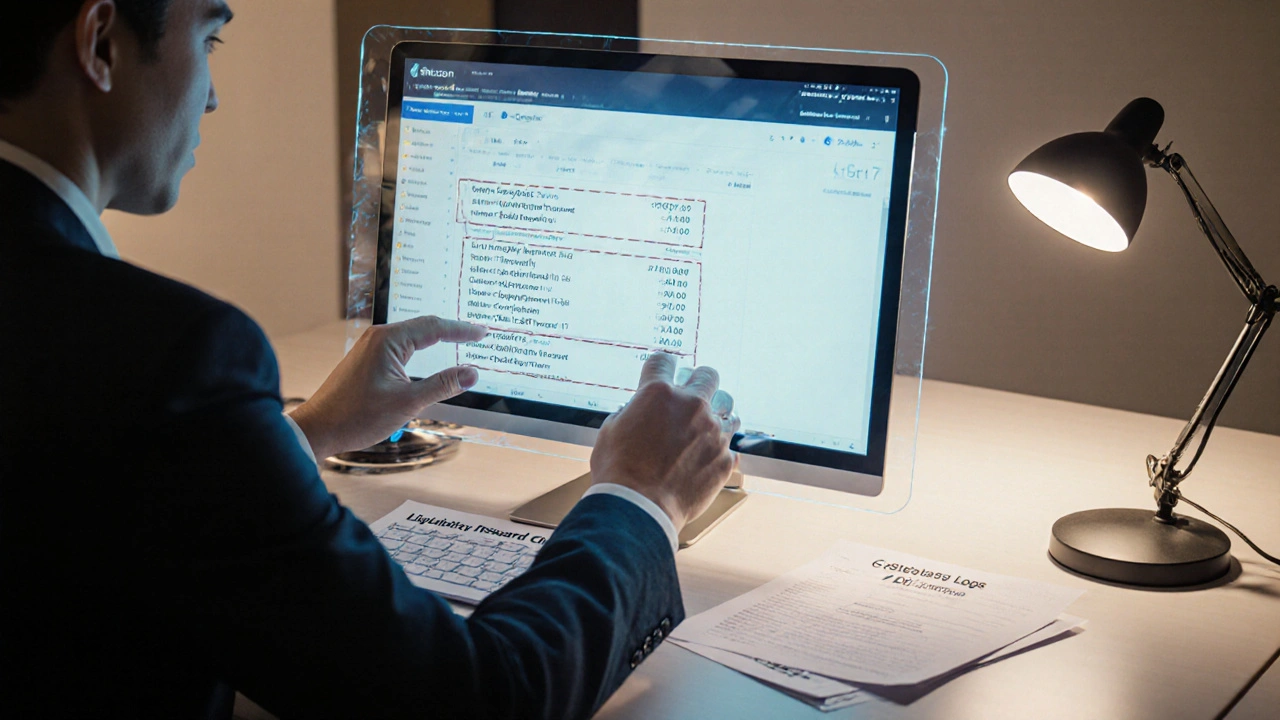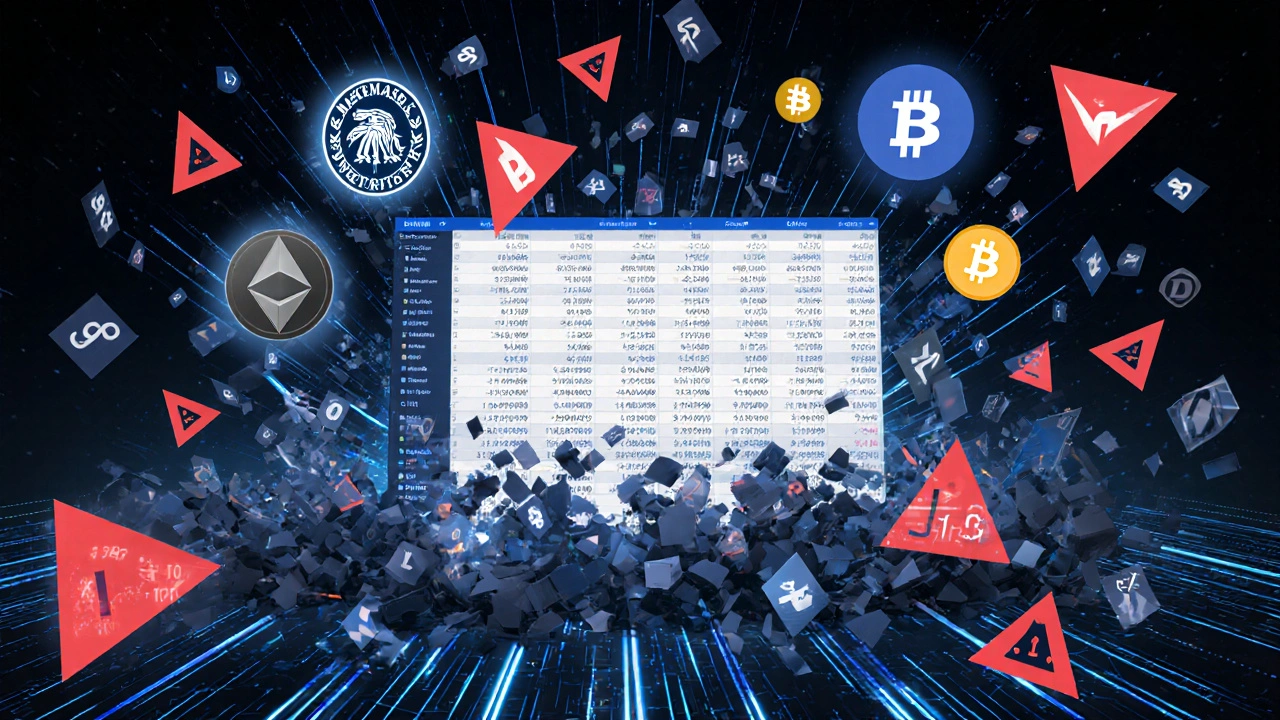Every time you swap tokens on Uniswap, deposit ETH into Aave, or pull rewards from a liquidity pool, the IRS sees a taxable event. Not one. Not two. But multiple separate events - each with its own cost basis, fair market value, and reporting requirement. And if you’re an active DeFi user in 2025, you’re probably running dozens, if not hundreds, of these transactions a year. The problem? Most people still use spreadsheets. And spreadsheets break at 100,000 transactions. You’re not just risking an audit - you’re risking penalties, interest, and years of backtracking.
Why Every DeFi Action Is a Tax Event
The IRS doesn’t care if you think swapping ETH for DAI is just ‘moving money.’ Under their June 2024 final regulations, every trade, deposit, withdrawal, reward claim, or gas fee payment counts as a taxable event. That means:- Swapping Token A for Token B = capital gain or loss
- Depositing ETH into a lending protocol = taxable income if you receive interest or rewards
- Withdrawing from a liquidity pool = sale of both tokens in the pair
- Paying gas fees in ETH = disposal of ETH, triggering a capital gain/loss
What You Must Track for Every Transaction
The IRS doesn’t ask for opinions. They ask for records. For every transaction, you need:- Date and time (to the second, if possible)
- Exact token names and amounts
- Fair market value in USD at the exact moment of the transaction
- Wallet addresses involved (sender and receiver)
- Protocol name (e.g., SushiSwap, Curve, Compound)
- Transaction hash (for audit proof)
- Gas fee paid in ETH or native token, and its USD value
- Cost basis of the tokens you spent
Cost Basis: The Hidden Nightmare
Your cost basis is what you paid for the asset - but DeFi makes this messy. If you bought 1 ETH for $2,000 in January and swapped it for 3,000 USDC in June when ETH was $3,500, your gain is $1,500. Simple. But what if you bought ETH in five different transactions over six months? Which one do you use? That’s where tax lot methods come in. The IRS accepts three methods:- FIFO (First In, First Out): Uses the oldest tokens first. Often results in higher gains if prices rose over time.
- Specific Identification: You pick which exact tokens you’re spending. Requires perfect records.
- HIFO (Highest In, First Out): Spends the most expensive tokens first. Can minimize gains - but demands meticulous tracking.

Why Spreadsheets Fail (and What Works Instead)
You might think Excel is enough. It’s not. Here’s what happens when you try:- Manual entry takes 47 hours for 217 transactions - one Reddit user reported spending that long just for 2024 taxes.
- Gas fees get lost. Rewards get misclassified.
- Cross-chain transactions (Ethereum, Solana, Arbitrum) are impossible to reconcile.
- One typo in a price or date can throw off your entire tax bill.
What the Software Gets Wrong - And How to Fix It
User reviews on Trustpilot and Capterra show a consistent pattern: tools handle Coinbase and Binance well, but stumble on DeFi. One user reported a $2,843 miscalculation on a SushiSwap liquidity pool exit. Why?- Some tools treat liquidity pool rewards as capital gains - but the IRS treats them as ordinary income.
- Others ignore gas fees as deductible expenses, inflating your gains.
- Some don’t recognize token swaps within a single transaction as separate events.
When to Call a Crypto-Savvy CPA
If you’re doing more than 50 DeFi transactions a year, or if you’ve used complex strategies like yield aggregation, leveraged positions, or governance token farming - hire a CPA who specializes in crypto. General tax preparers don’t understand DeFi. They’ll miss half your income. Tax attorney Andrew Gordon, a CPA who advises crypto clients, says: “Not tracking cost basis properly puts you at risk of overpaying taxes or underreporting gains. Both invite audits.” His firm reports 92% client satisfaction on DeFi cases - compared to 67% for general accountants. A good crypto CPA will:- Help you choose the optimal tax lot method
- Classify income vs. capital gains correctly
- Document your accounting policies for IRS compliance
- Prepare you for Form 1099-DA when it rolls out in 2026

Three Steps to Stay Compliant in 2025
Here’s your action plan:- Use automated tracking software - Connect all your wallets (MetaMask, Phantom, Trust Wallet) to CoinLedger or CryptoTaxCalculator. Let it pull every transaction. Don’t skip any chain.
- Reconcile weekly - Every Sunday, compare your wallet balances on-chain with what your software shows. Fix mismatches immediately. One missed transaction compounds over time.
- Review monthly - Check your positions in lending and liquidity protocols. Did you earn rewards? Did you add or remove liquidity? Record it. Don’t wait until tax season.
The Bigger Picture: What’s Coming in 2026 and Beyond
The IRS is ramping up. Form 1099-DA becomes mandatory for brokers in 2026 - but only for centralized exchanges. DeFi protocols? They’re not brokers. So you’re still on your own. Full third-party reporting for DeFi platforms won’t be required until 2027. That means 2025 is your last year to get your records in order without outside help. After that, the IRS will have more data - and they’ll be looking for gaps. If your 2025 returns are sloppy, you’ll be flagged in 2026. Meanwhile, the market is adapting. Chainalysis partnered with tax software firms in October 2025 to bring real-time transaction categorization. Gartner predicts 80% of DeFi tax compliance will be automated by 2027. But until then? You’re the auditor. You’re the accountant. You’re the one who pays the penalty if you get it wrong.Final Reality Check
DeFi was built to cut out middlemen. But the IRS isn’t a middleman. It’s the law. And it doesn’t care about decentralization, smart contracts, or Ethereum’s philosophy. It cares about taxable income. If you’re active in DeFi, you’re not just a crypto investor. You’re running a small business with complex accounting needs. Ignoring the tax side isn’t rebellion - it’s financial negligence. Start tracking. Use the right tools. Document everything. And if you’re overwhelmed - hire help. The cost of a CPA is nothing compared to an IRS penalty.Do I have to pay taxes on every DeFi swap?
Yes. The IRS treats every token swap as a taxable event, even if you’re just exchanging one cryptocurrency for another. Each swap triggers a capital gain or loss based on the difference between the cost basis of what you traded and the fair market value of what you received at the time of the swap.
Are gas fees tax-deductible in DeFi?
Yes. Gas fees paid in ETH or other native tokens are considered disposal events, meaning they trigger a capital gain or loss. The fee amount itself can be deducted as a cost of sale when calculating your capital gain on the associated transaction. For example, if you swap tokens and pay 0.005 ETH in gas, that 0.005 ETH is part of your cost basis for the transaction.
What’s the difference between FIFO and HIFO for DeFi taxes?
FIFO (First In, First Out) uses your oldest tokens to calculate gains, which often results in higher taxes if prices rose over time. HIFO (Highest In, First Out) uses your most expensive tokens first, which can reduce your taxable gains. HIFO is legal under IRS rules if you can prove you’re consistently using it with accurate records - but it requires detailed tracking of every purchase.
Can crypto tax software handle cross-chain DeFi transactions?
Yes, top tools like CoinLedger and CryptoTaxCalculator support Ethereum, Solana, Arbitrum, Polygon, and other major chains. They automatically pull transaction data from each blockchain and consolidate it into one report. However, you still need to manually review complex transactions - especially those involving multiple protocols in one hash - to ensure correct tax categorization.
What happens if I don’t report my DeFi transactions?
Failure to report can lead to IRS audits, penalties (up to 25% of underpaid tax), interest charges, and in extreme cases, criminal charges for tax evasion. The IRS has increased crypto-related audits by 247% from 2023 to 2024, and DeFi transactions are now the #1 target. Even small omissions can trigger red flags when cross-referenced with blockchain data.
Do I need to report DeFi rewards like staking or liquidity pool earnings?
Yes. All rewards - whether from staking, liquidity provision, or yield farming - are treated as ordinary income at their fair market value in USD on the day you receive them. This applies even if you don’t sell the tokens. The American Institute of CPAs confirmed this in July 2025 guidance. Failure to report rewards is one of the most common IRS audit triggers.
Is there a threshold for reporting DeFi transactions?
No. There is no minimum threshold. Even a $5 swap or a $0.10 reward must be reported. The IRS requires full disclosure of all digital asset transactions, regardless of size. The 2024 Form 1040 includes a direct question asking if you received, sold, sent, exchanged, or otherwise acquired any financial interest in digital assets - and you must answer truthfully.



Comments (13)
Mark Brantner November 21 2025
bro i just swapped 37 times last week and my spreadsheet crashed so hard i thought my laptop was possessed
now i use coinledger and it literally saved my life
also gas fees are deductible?? why did no one tell me this sooner
Kate Tran November 22 2025
so… i’ve been ignoring this whole thing and now i’m panicking
is it too late to start tracking? like, can i just go back and log everything from last year??
amber hopman November 24 2025
you’re not alone. i started tracking in january and it took me 3 weeks just to clean up my 2024 mess
but honestly? it’s way less stressful now. i do a 10-min check every sunday and i’ve got zero anxiety come april
you can do this. just start with one wallet and go from there
Jim Sonntag November 24 2025
the irs thinks we’re running a business but they don’t even know what a liquidity pool is
they’re gonna audit someone who did a flash loan arbitrage and ask ‘why did you send 0.02 eth to a contract that doesn’t exist?’
we’re the pioneers and they’re still using fax machines
Deepak Sungra November 25 2025
bro i did 142 transactions last year and i still think the irs is just trolling us
why do i have to pay taxes on rewards i never cashed out??
also i lost my private key last month so half my history is gone
hope they like my handwritten note saying ‘i forgot’
Samar Omar November 26 2025
the sheer arrogance of assuming that decentralized finance should be subject to centralized bureaucratic control is not just ironic-it’s philosophically bankrupt
we built this on trustless systems, on immutable ledgers, on code as law-and now we’re expected to submit spreadsheets to a 19th-century tax agency that still thinks bitcoin is a drug
the absurdity is not merely administrative-it’s existential
chioma okwara November 26 2025
u spelled ‘ethereum’ wrong in ur post
and u said ‘gas fee’ like it’s a noun not a verb
also ‘fair market value’ is not ‘price at the moment’-it’s the average over 5 mins
and u missed that hifo is not officially allowed unless u file form 8949 with a detailed log
so ur whole article is kinda wrong
John Fox November 28 2025
just use koinly
it connects to everything
you dont need to think about it
if it says gain then pay tax
if it says loss then chill
done
Tasha Hernandez November 29 2025
imagine spending 47 hours doing taxes for crypto like its your job
and then the irs still audits you because you forgot to report a 0.0003 eth reward from a defi pool you didn’t even know existed
imagine being the person who paid $2k in penalties for a $5 gain
imagine crying in your car after filing because your spreadsheet had a typo in row 782
we are not investors
we are unpaid accountants for a broken system
Anuj Kumar November 30 2025
the irs is lying
they dont even have the tech to track this
they just want you to pay so they can fund their drones
if you report you’re helping them spy on everyone
just use a mixer and forget it
they cant prove anything
Christina Morgan December 1 2025
if you’re doing more than 20 transactions a year, please just hire a crypto CPA
it’s not expensive
they’ll save you 10x what they charge
i paid $800 last year and got back $12k in deductions i didn’t even know existed
you’re not saving money by doing it yourself-you’re risking your future
Kathy Yip December 2 2025
i used to think tax compliance was just paperwork
now i realize it’s about identity
when you track every swap, every gas fee, every reward-you’re not just reporting income
you’re building a digital autobiography of your financial choices
and in a world that wants to erase your history with algorithms
maybe that’s the most radical thing you can do
Bridget Kutsche December 3 2025
just start with your most active wallet
connect it to crypto tax calculator
let it pull everything
then spend 15 minutes every sunday checking for mismatches
do this for 3 months and you’ll have a clean 2025 record
no panic, no 47-hour marathons
you got this. seriously. i’ve helped 50+ people do this. it works